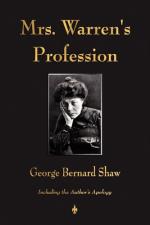and his environment: in a word, of problem.
The vapidness of such drama as the pseudo-operatic
plays contain lies in the fact that in them animal
passion, sentimentally diluted, is shewn in conflict,
not with real circumstances, but with a set of conventions
and assumptions half of which do not exist off the
stage, whilst the other half can either be evaded
by a pretence of compliance or defied with complete
impunity by any reasonably strong-minded person.
Nobody can feel that such conventions are really compulsory;
and consequently nobody can believe in the stage pathos
that accepts them as an inexorable fate, or in the
genuineness of the people who indulge in such pathos.
Sitting at such plays, we do not believe: we
make-believe. And the habit of make-believe becomes
at last so rooted that criticism of the theatre insensibly
ceases to be criticism at all, and becomes more and
more a chronicle of the fashionable enterprises of
the only realities left on the stage: that is,
the performers in their own persons. In this
phase the playwright who attempts to revive genuine
drama produces the disagreeable impression of the
pedant who attempts to start a serious discussion
at a fashionable at-home. Later on, when he has
driven the tea services out and made the people who
had come to use the theatre as a drawing-room understand
that it is they and not the dramatist who are the
intruders, he has to face the accusation that his plays
ignore human feeling, an illusion produced by that
very resistance of fact and law to human feeling which
creates drama. It is the deus ex machina
who, by suspending that resistance, makes the fall
of the curtain an immediate necessity, since drama
ends exactly where resistance ends. Yet the introduction
of this resistance produces so strong an impression
of heartlessness nowadays that a distinguished critic
has summed up the impression made on him by Mrs Warren’s
Profession, by declaring that “the difference
between the spirit of Tolstoy and the spirit of Mr
Shaw is the difference between the spirit of Christ
and the spirit of Euclid.” But the epigram
would be as good if Tolstoy’s name were put in
place of mine and D’Annunzio’s in place
of Tolstoy. At the same time I accept the enormous
compliment to my reasoning powers with sincere complacency;
and I promise my flatterer that when he is sufficiently
accustomed to and therefore undazzled by problem on
the stage to be able to attend to the familiar factor
of humanity in it as well as to the unfamiliar one
of a real environment, he will both see and feel that
Mrs Warren’s Profession is no mere theorem, but
a play of instincts and temperaments in conflict with
each other and with a flinty social problem that never
yields an inch to mere sentiment.




